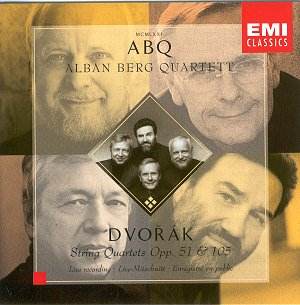Antonín DVORÁK
(1841-1904)
String Quartet in E flat, Op. 51 (1878/79)
String Quartet in A flat, Op. 105 (1895)
 Alban Berg Quartet
Alban Berg Quartet
Recorded live in the Mozartsaal Konzerthaus, Vienna May and June 1999 DDD
 EMI CLASSICS CDC5 57013
2 9
[62:58]
EMI CLASSICS CDC5 57013
2 9
[62:58]
Crotchet
AmazonUK
AmazonUS
Amazon
recommendations

As one would expect from the Alban Berg Quartet this live performance offers
much to marvel at in the sheer precision of the playing allied with a beauty
and depth of tone which is present throughout. Every bar has been thought
through in detail, every note has been studied. Yet paradoxically this is
where, for this listener at least, these performances do not quite live up
to the many listeners' high expectations. The disappointment is in the
spontaneity of the performance, that rush of adrenaline that we crave and
which, in the modern pursuit of perfection, can often be lost in studio
conditions yet which one hopes can be captured in a live recording such as
this.
This factor struck me most clearly in the opening Allegro non troppo
of the E flat quartet. There is some beautifully delicate playing here, yet,
after the initial bars, the allegro proper shows a slight feeling of restraint
that has the unfortunate effect of holding the music back. The Dumka
that follows fares better. There is considerable character here as well as
a spirit that is not always evident in the outer movements. The Andante
con moto also has some truly lovely moments yet once again the final
Allegro assai, in spite of its admirably taut ensemble, somehow failed
to convince me overall.
Of the two works it is the Op. 105 quartet of 1895 which receives the more
committed performance. Dvorák wrote the first movement whilst still
in America, only completing the work upon his return to Bohemia, with an
interruption caused by work on his Op. 106 quartet which was completed in
between. The first movement is finely played with the turbulent Allegro
appassionato which follows the introductory Adagio being particularly
well captured (try the fiery passage from around 3'40"). There is real character
and spirit in the playing here which does not come across in the earlier
work. The Molto vivace also shows that the players can find the Czech
spirit in the music and a sense of the exhilaration which the composer must
surely have felt upon his return to his homeland. The touching Lento e
molto cantabile is notable for some subtle touches of contrast
both dynamically and emotionally. The substantial final Allegro non
tanto is slightly less effective although the gradual build up to the
breathless conclusion is superbly paced.
There is both charm and beauty in these performances and I would not discourage
anyone from exploring this for themselves and forming their own judgement.
That said, a greater degree of vitality and unashamed abandon in performance,
particularly in the Op. 51 quartet, would have made this a truly memorable
disc as opposed to simply a good one.
Christopher Thomas

